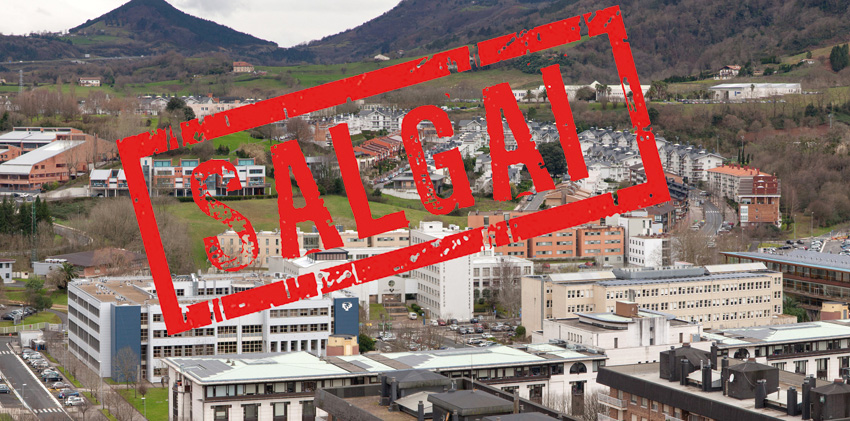Final step to commodification of education
- After the approval of the LOMCE, which aims to turn the neoliberal model of Compulsory Education, the objective now is the university: The new reform that the Spanish Government is preparing will give continuity to the seed planted by the Bologna process, to turn education into a product of the market and privatise it.

Bologna would represent a positive pedagogical change, approval with European qualifications, excellence in higher education. The reality is that the current model is increasingly closer to the university for the elite, with an increase in rates that has meant an average increase of 21% in the tuition price, a reduction in scholarships, a spectacular increase in the price of postgraduate programs that have made it almost compulsory... Fully classroom teaching and the credit system is integrated into the faculty and in the afternoon, private companies begin to assume competencies in the university, and the education opens up the doors.
The collective Ikasle Abertzaleak (IA) believes that behind Bologna is the objective of moving closer to the financial model of Anglo-Saxon universities and, consequently, to privatise and commercialise education, within the framework of the European Union’s EU2015 Plan. This strategy would also respond to the university reform prepared by the Spanish Minister of Education, José Ignacio Wert, and which is now being modernized. It is believed that he will present it before the end of this course and part of the report of a group of experts selected by Wert: Proposals for innovation and improvement of the quality and effectiveness of the Spanish university system. The report analyses the reform of the EU2015 University, published this week by Ikasle Abertzaleak. A route to deepen the oppression in the leaflet. These are some of the keys proposed by the experts to anticipate what will be a university reform that will affect Hego Euskal Herria.
External evaluations
Like the LOMCE, external public and periodic evaluations are proposed “external, objective, economic and simple”. Two options are set out to carry out these evaluations: to create a new agency or to be able to move forward, to take responsibility for it by the ANECA agency. It is the ANECA that defines the foundations of the Bologna Plan and represents the interests of many large companies, hence the criteria which universities will evaluate. If we go ahead, the importance of this evaluation will be great, because in addition to the public results – in addition to the universities competing with each other – funding will be made according to that ranking, and not taking into account those who need it most – rewarding some and sinking more and more or directly eliminating those who have the least resources. In other words, in order to achieve a good qualification, universities will follow the criteria of these evaluations, both in their content and in their operation. And what are those criteria?
Quality = Performance
The group of experts relates the quality of the university not to teaching and training, but to the field of research. And the more satisfactorily the companies' interests are met by research, the better the university will be valued: “It is proposed that companies, financed by public funds, use the university to carry out the necessary research for the business and increase the profits, and therefore measure the quality according to the amount of such research. This has only one name: commodification,” the AI has denounced.
Private management
For the government of universities, the report demands “transparency” and “professionalization”, removing in practice the management of the educational community and incorporating private managers; and also demanding the “rationalization of organs”, reducing in practice the decision-making organs in number, size and function and concentrating power in few hands. Among other things, the Faculty, which according to the experts is merely advisory, will be appointed directly by the Rector. The rector himself, who should no longer be someone from within the university, would also be decided by the Council of Universities, and this council would involve people from outside the university – elected by the government of each autonomous community; experts recommend people “from the business world” and “personalities”. The report emphasises that the status of rector is not compatible with the exercise of politics, trade unions or function, but it says nothing about being an entrepreneur, and in the Anglo-Saxon faculties we have seen that as people from outside have been coming in to govern universities, they have often been left in the hands of entrepreneurs.
Professors selected on demand
It proposes a “defunctionalization” of the faculty, to which a new process of selection by opposition is added: that the university itself can hire professors and professors – 49% of the professors in this way could be elected. So the AI says that universities compete to choose the best teachers, and the ones with the most money will be the ones with the most money. These teachers, in addition, could be hired and dismissed as private companies and the selection criteria are not clear either: removing the instruments of choice by opposition or by voting, “when criteria are proposed for manual selection of deans, researchers, rectors and rectors and when what is to be promoted is the recruitment of internationally known people, questions are asked whether they will not recruit the groups of students with specific profiles (especially) according to personal criteria.”
Non-public financing
The group of experts proposes new avenues, arguing that public funding for universities is at risk. These include – once again – the creation of a body of people outside the University to make “sustainable, effective and rational” decisions, with a special preference for business representatives. Collaboration with the business world and the conclusion of funding agreements, increased competition in the regulation of fees and prices for each university, the proliferation of student scholarship loans – and the distribution of scholarships on the basis of “excellence”, not necessity – or the avoidance of ineffective costs – in practice, redundancies in cases where too many workers are considered, for example. Ultimately, the logic of profitability will prevail over the social function of education.
Cost-effective subjects
One of the priority criteria for the creation, maintenance or abolition of studies, due to the existence of an excessive degree, will be the “ability to access the economic resources” of such learning and the registration minima will be established to be able to offer a degree. That is what the report says. They also propose chairs or nominals derived from the Anglo-Saxon model, that is, degrees and subjects financed by private companies. It is not difficult to guess what kind of studies are going to go ahead and which are not, especially given that the content, practices and research are going to be very much related to the market. The report also calls for the specialisation of campuses and for offering the same career in different places, forcing the mobility of students and teachers. In this globalised context, it is to be assumed that English will become even more important and that – in order to avoid duplication of lessons – Euskera will not be among the priorities. It is a question of promoting specialization, especially in postgraduate and master's degrees, once again moving people with less economic resources away from higher education.
The reform will move the very structure of the university, of education, if all these points are fulfilled, among others. Although the final writing has not yet been submitted, the report makes it clear what the direction is, and the Abertzales Students place it within a well-defined planning: Reference is made in the prospectus to the General Agreement on Trade in Services. It is an agreement signed by 144 countries of the World Trade Organization that governs most public services, including education and health. In short, this agreement is the way to make basic and public services available to the market and to open the door to privatisation.
How do you deal with what's coming? Gaizka Azketa, an AI member, makes it clear: “We will visualize and fight against the neoliberalization process carried out by the university in a constructive way. We will carry out actions of disobedience of the faculties during the month of March and after the general student strike of 26M we will set in motion several dynamics in the universities with the objective of the Basque National School”.
Finantzazio beharraren eta dibertsifikazioaren aitzakian, molde disimulatuagoan batzuetan eta ageriago bestetzuetan, enpresa pribatuek unibertsitateetako ateak gurutzatu dituzte dagoeneko. Ohikoa da kafetegi pribatuak, freskagarri jakinen makinak edota banku sukurtsalak fakultateetan aurkitzea, baita babesletza eta iragarkiak ere pasillo, kirol instalazio, bulego edo testuliburuetan. Eroskik supermerkatua ireki berri du EHUren Leioako campusean, Liburutegi Nagusiaren eraikinean. ExxonMobil petrolio korporazioak prentsa askatasunaren inguruko masterra eskaintzen du AEBetako unibertsitate batzuetan, eta 133 ikastetxetako hainbat zerbitzu kudeatzeaz arduratzen den Edison enpresak hezkuntza saioak ematen ditu telebista estatubatuarrean: hango eskolen %40tan ikusten dute saioa, 12 minutu egunero, horietatik bi minutu iragarkiei eskainiak.
Hain urrutira joan gabe, azalean PortAventuraren babesletza daraman Munduko kulturak testuliburua landu dute Kataluniako hainbat ikastetxetan: Generalitateak homologatuta, gizarte zientzietan erabili dute eta kultura maia, azteka, Txina, Polinesia eta Far West jorratzen ditu liburuak, hain juxtu parke tematikoan aurki daitezkeen kulturak. Liburuko argazki batzuk, gainera, PortAventuran ateratakoak dira eta ikasgaia gainditzeko haurrek parkera joan behar izan dute, sarrera eurek ordainduta.
Endowement eredua ere arriskutsuki ari da ugaritzen: enpresek ikerketa eta ikasketa jakinetan inbertitzen dute, normalean etekina ateratzeko asmoz, esaterako ikerketaren jabetza eskuratuz –edo zati batena–.
Ikasle Abertzaleen izenean martxoaren 17ra arteko dinamiken eta eguna beraren balorazioa plazaratu dute. Jarraian irakurgai.
“Ikasle baterajotze nazionala” deitu dute Ikasle Abertzaleek martxoaren 17an, Euskal Herriko herrialde guztietako borrokak bateratzeko asmoz.
Milaka ikaslek Bilboko karrikak hartu dituzte erreformei aurre egiteko Bizkaiko Ikasle Abertzaleak, Bilboko eta Leioako ikasle mugimenduak deitutako greba egunean.
Joan den astean, kalera atera ziren ikasleak, dagoeneko egosten ari diren unibertsitate erreformaren aurka protestatzeko. Erreforma oraindik aurkeztu ez bada ere, Espainiako Gobernuak eskatutako adituen txostenean oinarrituz hona laburrean aurreikus ditzakegun hainbat puntu.
“Armiarmak lehoi bat hiltzeko gai izaten dira beren sareak batzen dituztenean”, dio esaera etiopiar batek. Batasunak indarra omen dakar.
Ikasleak kalera atera dira Hego Euskal Herrian unibertsitate erreformaren barruan berriki dekretu bidez onartutako 3+2 sistemaren aurka protesta egiteko, Ikasle Abertzaleek deituta. LOMCE eta Heziberri ere jomugan dituzte ikasleek.
Espainiako Gobernuak unibertsitateetan 3+2 plana ezarri nahi duela-eta, otsailaren 26an kalera aterako dira ikasleak, Ikasle Abertzaleek deituta.LOMCEren aurka ere aterako dira, Espainiako Estatuko trantsizio garaitik egingo den 13. hezkuntza erreforma dena.
Otsailaren 26an ikasleak kalera aterako dira, LOMCE, EU2015 unibertsitate erreforma eta berriki dekretu bidez onartutako 3+2 sistemari aurre egiteko, Ikasle Abertzaleek deituta.
Unibertsitateek graduko ikasketak lau urtetik hirura murriztu eta graduondokoak urtebetetik bira luzatzeko aukerari ateak zabaldu dizkio Espainiako kongresuan PPk onartu berri duen dekretuak. Erabakiaren kontra agertu da Euskal Herriko hezkuntza komunitatea.
Desobedientziaz Irauli! Astea egin dute ikasleek, datorren unibertsitate erreformaren aurka. Manifestazio eta protesta ekintzez gain, txostena, bideoa (ikusi behean), asanblada informatiboak, tailerrak eta hitzaldiak antolatu dituzte, erreformaren arriskuez ohartarazteko... [+]
Unibertsitate Erreforma aurrera ateratzeko estrategiaren barruan kokatzen dute Ikasle Abertzaleek azaroaren 27an onartuko den EHUren berrantolatze organizatiboaren lehen fasea, "aldaketa sakonagoei bide emateko lehenengo keinua". Erreforma "Boloniaren... [+]
Ostegun goizean bi polizia operazio izan dira Hego Euskal Herrian. Batetik, hainbat ikasle atxilotu dituzte Iruñean, martxoaren 27ko grebarekin lotuta. Bestetik, Bilbon hiru pertsona atxilotu ditu Ertzaintzak, dirudienez, Troikaren Aurka Martxoaren 3an izandako... [+]




















